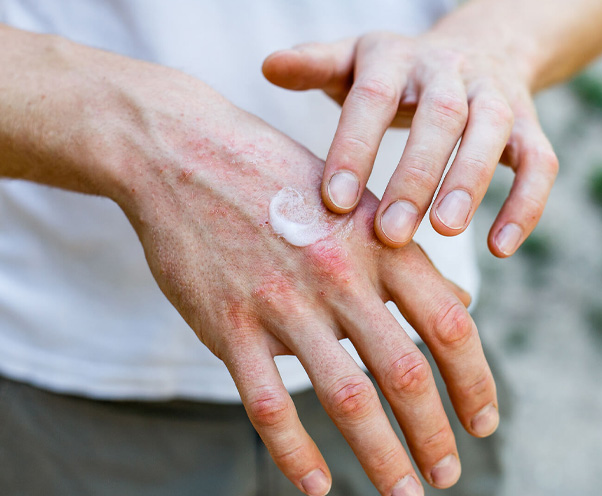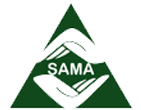It’s Time to Tackle Skin Problems in the Construction Industry

If you work in construction, constant use of hands and being on your feet all day can neglect your skin. Exposure to harmful chemicals, harsh outdoor conditions, and heavy-duty PPE can lead to serious skin conditions. Occupational skin diseases are common among construction workers and can seriously affect finances due to the impact of taking time off and the self-employed nature.
Why should you look after your skin and hands?
Our skin, the largest organ, reflects overall health and is our primary defence against bacteria and germs.
Women are significantly underrepresented, comprising only 15% of construction workers, with a mere 2% working with tools. Ill-fitting PPE poses challenges, leading some to expose their skin to irritants or wear oversized shoes, risking injuries.
Dry or irritated hands/feet with cuts invite bacterial infections, hindering work efficiency and causing illness. Ignoring such issues can lead to staph infection from the bacteria always present on the surface of your skin or tetanus if cuts and cracks on your hands are left untreated, as the bacteria like to live in these areas. Proper skincare is crucial for both men and women in construction to ensure health and productivity.
Common construction conditions
Construction work has inherent risks, including injuries from dangerous situations and heavy-duty machinery. Prolonged use of vibrating tools like chainsaws or pneumatic drills can lead to hand-arm vibration syndrome (HAVS), where nerves sustain minor injuries, causing gradual loss of function. Carpal Tunnel Syndrome (CTS) and Vibration White Finger (VWF), the most common disease prescribed under the Industrial Injuries Disability Benefit scheme, resulting from excessive tool use.
These conditions can lead to health issues and work loss, significantly impacting finances, especially for self-employed individuals. Preventive measures include:
- • Using appropriate Personal Protective Equipment (PPE).
- • Opting for low-vibration tools.
- • Using additional PPE like anti-vibration gloves or wrist braces.
- • Taking regular 10-minute breaks and keeping hands warm during work is also beneficial.
Contact Dermatitis
Contact dermatitis, accounting for 80% of work-related skin conditions, causes an uncomfortable and itchy rash. Working with materials like cement sans proper protective equipment can trigger it, even without prior skin issues. Once an unknown allergy is activated, your skin may remain susceptible to that material for life, as desensitisation is impossible.
To safeguard against contact dermatitis, ensure your employer provides well-fitting PPE. Prevention is key; wearing gloves or long sleeves post-exposure won’t cure the condition. Instead, adopt a regular moisturising routine, avoid allergens, and consult your doctor for medicated creams. Protecting your skin is vital for a healthier work experience.
Dry, Cracked Skin
Dryness and irritation are common skin issues, with 62% of UK buyers purchasing products claiming to treat dry skin. Working outdoors or with hazardous materials can exacerbate conditions like eczema, subjecting hands and feet to daily stress and irritants.
Frequent hand washing or sanitising removes the skin’s natural protective oils, leading to sore, parched skin and a weakened skin barrier.
To protect your skin, Margaret Dabbs recommends regular use of moisturiser, applying hand and foot lotion in your daily routine and after washing hands. Using sanitisers with added moisturisers is beneficial, but a dedicated lightweight, non-greasy lotion is ideal for post-sanitisation. For intensive treatment, apply a thick layer of cream before bedtime, wearing gloves or socks to enhance absorption. Prioritise moisturising to prevent dry, cracked skin and potential injuries.
Skin Under Pressure
Wearing thick, hard shoes like steel-toe caps common in construction can create excessive pressure on feet, especially if the shoes don’t fit well. This pressure can lead to hyperkeratosis, where the skin produces thick layers in response to irritants or pressure, causing pain and walking difficulties. Calluses and corns can also form due to thickened skin, which is particularly painful for construction workers who spend long hours on their feet or working with heavy tools.
To heal your skin, moisturise and exfoliate feet with hydrating lotions and gentle foot scrubs to prevent hyperkeratosis. Use a foot file to remove dead skin and nourish the newly-revealed skin with hydrating foot oil. For corns and calluses, alleviate pressure by placing wool, soft cotton, or moleskin between toes. Taking care of your feet is crucial for a comfortable and productive work experience.
Serious Skin Damage
Neglecting skin conditions can have severe consequences, impacting motor skills, work, and overall health. Approximate around 16,000 individuals believe their skin conditions worsen due to work-related factors. Incorporating sunscreen into your daily routine is essential, especially if you work primarily outdoors, on sites or around scaffolding. Incorporating sunscreen with at least SPF 30 and broad-spectrum UVB and UVA ray protection is crucial, especially for outdoor workers. Sunscreen should be used daily, even on cloudy days, as sun damage accumulates over time. Following these skin-saving tips and seeking medical advice for worsening conditions or serious illnesses like skin cancer is essential for maintaining healthy and hydrated skin.
So try some of these skin-saving tips today and notice how hydrated and fresh your skin feels. Remember to always consult your doctor or dermatologist if your skin condition worsens. If you have a more severe illness, such as skin cancer, contact your doctor before using any non-prescribed treatments or creams on your skin.
(This "HSE" Published in December 2023 Edition)












